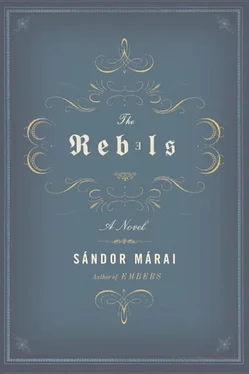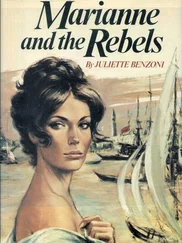“It’s finished, I think,” he said slowly, with surprise. “I’m quite certain now that we will survive.”
He looked straight ahead and gave a shiver.
“I wasn’t so sure of it before.”
AT PRECISELY TWO O’CLOCK THEY STOPPED OUT-SIDE the pawnbroker’s. It was the only two-story house in the passage. The gray heat spread everywhere, thick as glue. Metal shutters covered the entrance. They rang at the side door and waited, and when no one answered, Tibor turned the door handle and led the way in. The damp sour smell of cabbages greeted them in the dim stairwell, where narrow wooden steps led up to the pawnbroker’s apartment.
Plaster was peeling from the wall. Dirt, cobwebs, a squalid sense of neglect enveloped them.
“Are you scared?” asked Ábel.
Tibor stopped and looked around.
“No,” he said uncertainly. “Not exactly. What I feel is loathing, just as the actor said I would. And the air is foul.”
He turned round.
“Leave it to me and don’t say anything,” he said quietly.
They had dined at the riverside café, having spent the remainder of the morning in silence. Only occasionally did Tibor emerge from the water and venture onto the shore to lie on his back, gently rocking. They had undressed in the same cabin, their talk general and louder than usual, Ábel laughing a lot, rather nervously, and once outside they shouted ribaldries at each other across the banks. They seized every chance of rendering the memory of what had earlier passed between them as uninteresting as possible. They talked of things that were of no great consequence, of their plans, of what the future might have to offer should things work out well, providing that the insignificant event that was waiting for them—the enlisting and what Kikinday had tactfully referred to as “setting off on their travels”—did not prevent them. Tibor wanted to set up a stud farm in the lowlands. Why specifically a stud farm he could not say, but he confessed that he had been reading up on the subject and had secretly struck up acquaintance with horse dealers. Having dwelt on this for a while he suddenly stopped as if he had just woken up and courteously asked: And you?
Ábel shrugged. “Might go abroad,” he said.
The sky was gradually clouding up. There was a distant rumbling but the rain couldn’t quite rouse itself to fall. They were helpless. They couldn’t think of anything more to say. Ábel went into the cabin first, then waited in the street while Tibor got dressed.
There were two doors along the upstairs corridor and they looked and wondered what to do. But before they could knock one of the doors opened and Havas stepped out.
Later, when Ábel thought back to this afternoon, to these days generally but specifically to this afternoon and this night, it was, above all, to the shock he experienced the moment he saw the pawnbroker emerge through the door of his apartment. Havas is standing in the doorway, wiping his walrus mustache with the back of his hand, smiling, he bows a little, and, using one hand only, fusses with the unbuttoned collar of his shirt. As he smiles his eyes are almost entirely obscured by the rings of fat that surround them. He makes a welcoming gesture towards the door and allows them to pass through it ahead of him. His breath reminds Ábel of kitchens, of washing-up and cold lard. That might be because the hall too smells strongly of stale food and the table of the room into which they are ushered is covered with the neglected remains of food in bowls, on plates, and in cups. None of this would strike him as shocking were it not for some glimmering memory, larger than life, that he has seen all this and experienced it before. But at the same time he knows for a fact that he has never been here. It was a dream, a dream in which he had met Havas, who had appeared, exactly as he has just done, in his doorway, wiping his walrus mustache with the back of his hand, buttoning up his collar with the very same smile. It is as if he has experienced it all: the smell of cold food, everything down to the last detail, the smell, the quality of light, the sounds, all exactly the same. He knows that this is the only possible way for the pawnbroker to appear, smoothing his mustache, fussing with his collar, but never before has he been quite so shaken by a sense of déjà vu, to the extent that he takes a startled step back. But the pawnbroker fails to notice his shock, bows low before them and ushers them into the room, then closes the door.
“Please be so good as to take a seat,” said Havas, pushing two chairs up to the table. “I assume the young gentlemen have had their dinner. I would be greatly obliged if they would permit me to continue mine.”
He waited courteously while Tibor indicated that they did not mind, then sat down, tied the napkin around his neck, and took a brief survey of the pots and plates.
“I do believe I had got this far,” he eventually said and pulled a dish of what looked like pâté towards him, dipped into it with a soup spoon, and pushed the spoon into his mouth. “Do not be astonished that I eat meat without bread,” he said, chomping with what seemed like a modest smile. “Bread is fattening. Meat is not. I have got used to doing without bread altogether as you can see. May I offer the gentlemen something?”
“Please do not trouble yourself, Mr. Havas,” said Tibor.
“A nip of kontusovka ? No?”
The uncorked earthenware bottle lay on the table within easy reach.
“A sickly overweight person like me has to be very careful what he eats,” he said, taking a swig from the bottle. “I have to maintain a diet of sorts.”
He waved his enormous hand over the table with its bowls, plates, cups, and salvers where slices of meat, pâtés, and various kinds of sausage lay in cold melted fat. There was no fresh food anywhere. The pawnbroker was clearly a carnivore, and kept every small remnant of meat.
“I’m a lonely old widower and must watch what I eat,” he repeated, cutting a slice of beef, picking it up, and biting substantial chunks out of it.
“So I have worked out my own diet. Flesh is the most easily digestible material, gentlemen. It breaks down so readily. I only have to cook twice a week, on Saturday and Wednesday. Nothing but meat. I can’t eat in restaurants,” he said closing his eyes, “because the portions I allow myself there are so minuscule they attract too much attention. You get to an age when you don’t want to draw too much attention to yourself. In my case,” he hesitated as he licked a finger shining with grease, “I have to eat two pounds of meat at any single sitting.”
He picked up a hunk of half-chewed ham on the bone, raised it to the light and took a bite out of what was left on it.
“I feel positively ill otherwise,” he declared. “I must have precisely two pounds of flesh, without bread, once at dinner, once at supper. I cook such meat as will keep for a few days. I have to watch that there is some variety too. I have an extraordinary digestion. It will accommodate four or five kinds of meat, and indeed desires two pounds of it, but if I eat only one kind, say for instance two pounds of beef at dinner, my stomach demands attention by the afternoon. Pâté is my chief source of nourishment. I keep a constant supply of various pâtés because they keep best without going bad. Sometimes I have to eat in the afternoon too. May I offer you a slice?”
He pushed the gray pâté in front of them.
“Ah well, as you please.”
He took a big bite out of the ham, his teeth tugging at an obstinate shred of meat, and tore some gristle from the bone.
“I take the odd sip of kontusovka between bites. This is genuine, pure, Polish kontusovka. It keeps your stomach in order. One’s intestines are constantly in rebellion, gentlemen, and kontusovka works through the system like a hose, like a fireman’s hose, a squirt or two puts out the fire, brings peace. I commend it to you.”
Читать дальше












